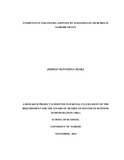| dc.description.abstract | In the formulation of an organization corporate strategy, researchers have emphasized the
importance of fitting or aligning the organizations strategy with an appraisal of the
organization‟s internal and external environmental opportunities and threats. The
objective of this study was to determine the competitive strategies adopted by the
mainstream Churches in Nairobi County. The descriptive and research adopted the
descriptive and cross sectional design. The population of the study was all the seven
mainstream Churches in Nairobi County. Primary data was collected using structured
questionnaire. The data was analyzed by the use of descriptive statistics to summarize
and relate variables which were attained from the administered questionnaires. A
multiple regression model was developed to describe the relationship between the
strategies adopted and the extent at which they are adopted by the mainstream Church.
The findings of the study were that differentiation, Low cost leadership, Focus
differentiation, diversification and clears strategic direction were used as the competitive
strategies within the mainstream Churches. The studies found that the base for member‟s
choice of one Church against the others is the clear specific direction, wide range of
programs that are customized to meet the diverse needs of the members. Engagement of
well-trained pastors and other qualified professionals in the operation of the Churches
contribute greatly to the competitive positioning of most of the mainstream Churches.
Future research could therefore investigate extent to which these findings can be
generalized to other Churches, evangelical, Pentecostal and charismatic Churches, and
other Church related institutions. The sample used focused on mainstream Churches only.
Further research is recommended on all the Churches using a larger sample for the
purposes of generalizations. A cross sectional study across of a number of denominations
within the sector can also be done to make comparative analysis. This being a cross
sectional survey design, the researcher responses were limited to the 7 mainstream
Churches. A generalization of the findings to represent a wider and more diverse sample
of Church sector would have provided a broader insight on the subject and especially
reveal any industry specific differences. | en_US |

